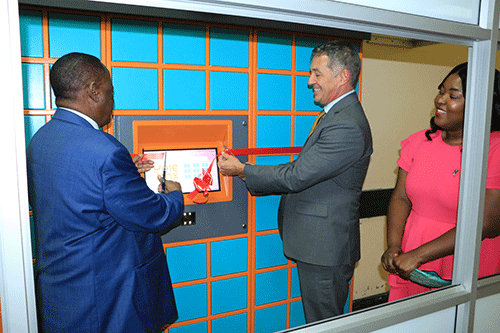Health minister Dr Kalumbi Shangula last week launched a chronic medicine collection system called Pelebox Smart Lockers, enabling patients to collect their chronic medication privately without joining long queues.
Shangula said by providing an easy and accessible way for patients to collect their repeat medication, the smart lockers will reduce the chances of patients missing their medication refill appointments, leading to better health outcomes.
“The machines (boxes) are easy to use, and are placed in public facilities such as hospitals, health centres and clinics. At present, 19 Peleboxes are installed at various locations around the country. More will be installed in future,” he added.
The lockers have been installed at the Epako Clinic, Oshakati Intermediate Hospital and the Oshikuku Catholic Hospital, amongst others.
Shangula said eligible patients who are clinically stable and on chronic medication will be able to benefit from this system. These include patients who use ARV medication, anti-epileptic medication, anti-hypertensive medication, and other cardiovascular disease treatments.
There are currently more than 180 000 people living with HIV (PLHIV) on treatment, and more than 40% of them may be eligible to use these machines.
The lockers will allow patients to collect their medicine within 24 hours.
“Care has been taken to ensure safety and confidentiality in the manner in which the medicines distributed through Peleboxes are handled. This again is achieved through the use of technological innovation,” he added.
The Smart Lockers communicate directly with the client through the client’s mobile phone to authenticate the credentials of the client.
“Once the medication is placed in the client’s smart locker, the client receives a one-time pin, more commonly referred to as OTP. This is more or less the same technological solution used when money is transferred through online banking transactions,” the minister stated.
Since the OTP is sent directly to the client’s phone, it means only the owner of the mobile phone has access to the OTP and, consequently to the medication, unless such owner grants a trusted person access to the OTP.
The cost of the lockers is based on the purchase of the lockers, which come with a digital platform, security features and air- conditioning to ensure the medicines stay cool,a budget for maintenance is required, and a contribution towards personnel costs for operational support as well as support for personnel within the division of pharmaceutical services through the health ministry.
The financial support for the lockers is part of the overall support provided through the cooperative agreement between the US’s Centre for Disease Control (CDC) Namibia and the ministry through funding from PEPFAR, the US government’s global effort to combat HIV, and the largest global health programme. In 2022, Namibia received US$ 94 million, equivalent to N$1.5 billion, through PEPFAR to support Namibia’s HIV and TB prevention, care and treatment response. – ljason@nepc.com.na



